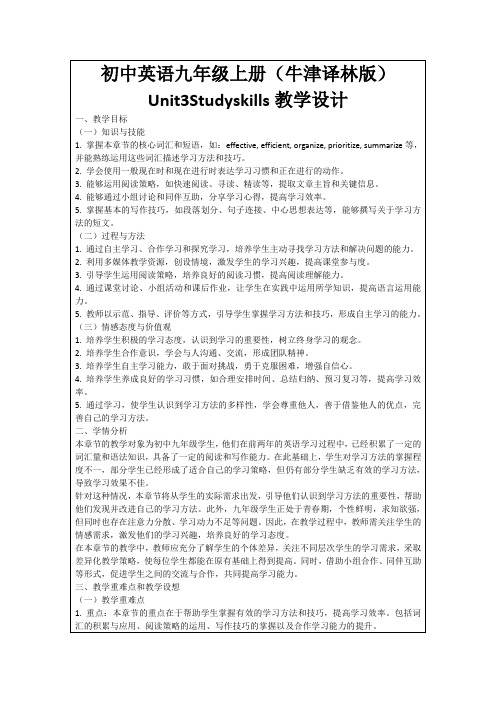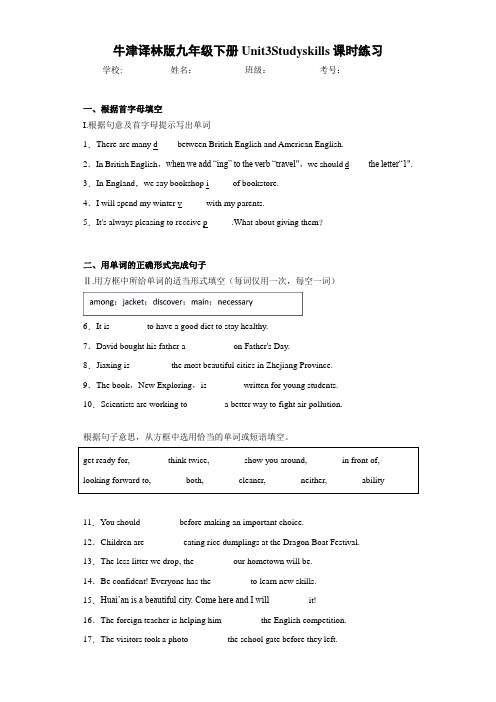Unit3 Study skills & Task
初中英语九年级上册(牛津译林版)Unit3Studyskills教学设计

1.培养学生积极的学习态度,认识到学习的重要性,树立终身学习的观念。
2.培养学生合作意识,学会与人沟通、交流,形成团队精神。
3.培养学生自主学习能力,敢于面对挑战,勇于克服困难,增强自信心。
4.培养学生养成良好的学习习惯,如合理安排时间、总结归纳、预习复习等,提高学习效率。
5.通过学习,使学生认识到学习方法的多样性,学会尊重他人,善于借鉴他人的优点,完善自己的学习方法。
3.阅读策略:教师引导学生运用阅读策略,如快速阅读、寻读、精读等,对文章进行深入理解,提取关键信息。
(三)学生小组讨论
1.教学活动:学生分成小组,讨论以下问题:“你们认为自己的学习方法有效吗?为什么?请分享一种你认为最有效的学习方法。”
2.小组分享:各小组代表汇报讨论成果,其他小组成员进行补充。
3.教师点评:教师针对各小组的分享进行点评,提炼出有效的学习方法,并对学生的表现给予肯定。
二、学情分析
本章节的教学对象为初中九年级学生,他们在前两年的英语学习过程中,已经积累了一定的词汇量和语法知识,具备了一定的阅读和写作能力。在此基础上,学生对学习方法的掌握程度不一,部分学生已经形成了适合自己的学习策略,但仍有部分学生缺乏有效的学习方法,导致学习效果不佳。
针对这种情况,本章节将从学生的实际需求出发,引导他们认识到学习方法的重要性,帮助他们发现并改进自己的学习方法。此外,九年级学生正处于青春期,个性鲜明,求知欲强,但同时也存在注意力分散、学习动力不足等问题。因此,在教学过程中,教师需关注学生的情感需求,激发他们的学习兴趣,培养良好的学习态度。
四、教学内容与过程
(一)导入新课
1.教学活动:教师展示一组学习方法的图片,如“合理安排时间”、“做好笔记”、“积极参与课堂”等,引导学生关注学习方法的重要性。
牛津译林版九年级上册Unit 3《Teenage problems》(Study skills)教学

牛津译林版九年级上册Unit 3《Teenage problems》(Study skills)教学设计一. 教材分析牛津译林版九年级上册Unit 3《Teenage problems》(Study skills)围绕着青少年的学习方法展开,旨在让学生通过阅读、听力、口语和写作等环节,了解并掌握各种学习方法,以及如何有效地解决学习中遇到的问题。
本节课的主要内容包括:不同学生有不同的学习风格和策略,如何选择适合自己的学习方法,以及如何养成良好的学习习惯等。
二. 学情分析九年级的学生已经具备了一定的英语基础,能够进行简单的听、说、读、写操作。
但部分学生在面对较复杂的文章时,可能会存在阅读困难,理解能力有限。
此外,学生对学习方法和策略的认识相对较弱,需要老师在教学中进行引导和启发。
三. 教学目标1.知识目标:让学生掌握与学习方法相关的词汇和表达,如effective,strategy, improve等。
2.能力目标:培养学生通过阅读、听力、口语和写作等多种方式,理解和运用本节课所学内容。
3.情感目标:引导学生认识到学习方法的重要性,激发学生探索适合自己的学习方法,养成良好的学习习惯。
四. 教学重难点1.重点:让学生理解和运用本节课所学词汇和表达。
2.难点:引导学生如何选择适合自己的学习方法,以及如何养成良好的学习习惯。
五. 教学方法1.任务型教学法:通过设定各种任务,让学生在实践中学习和运用英语。
2.合作学习法:鼓励学生分组讨论,培养学生的团队协作能力。
3.情感教学法:关注学生的情感需求,激发学生的学习兴趣。
六. 教学准备1.教材:牛津译林版九年级上册Unit 3《Teenage problems》(Studyskills)2.多媒体设备:电脑、投影仪、音响等3.教学素材:相关学习方法的文章、视频等4.课件:制作与本节课相关的内容,包括词汇、图片、视频等七. 教学过程1.导入(5分钟)利用课件展示一些关于学习方法的名言,如“活到老,学到老”、“适合自己的才是最好的”等,引导学生思考如何选择适合自己的学习方法。
9A Unit 3-8 Study skills

高邮市初中英语导学案(9A Unit 3 Study skills)班级:____________ 姓名______________ 自我评价______________ 【学习目标】1、知识目标:1) 学会怎样做改错题和感知这个技巧的基本方法。
2) 让同学体会该技巧的重要性。
2、技能目标:通过应用和扩展练习,让学生基本掌握改错题的技巧。
3、情感目标:培养学生认识到知错就改才能不断进步,愿意及时改正错误。
学习过程【预习指导和检测】一、预习导航(一)预习P56内容,并完成其中的练习。
(二)用波浪线划出你认为重点的词组及句子,并背熟。
(三)回答问题:Do you often check your homework after finishing it?二、预习成果(一)选择下列短文中错误的类型,并在横线上改正。
A= spelling mistake B=punctuation(标点)mistake C= wrong tenseD= word usage E= missing wordThat is interesting to visit another country but there are1. ( ) _______________sometimes problems while we don’t know the language2. ( ) _______________good. It may be difficult to talk with the people there.3. ( ) _______________We may not know what to use the telephone.4. ( ) _______________We may not know how to do the shoping.5. ( ) _______________After a short time, however, we learn what to do and what to say?6. ( ) _______________We learned to enjoy life in another country, and we may be sorry to leave.7. ( ) _______________(二)完成上面练习后思考一个问题。
牛津译林版九年级下册Unit3Studyskills课时练习

牛津译林版九年级下册Unit3Studyskills课时练习学校:___________姓名:___________班级:___________考号:___________一、根据首字母填空I.根据句意及首字母提示写出单词1.There are many d____ between British English and American English.2.In British English,when we add “ing” to the verb “travel",we should d____ the letter“1". 3.In England,we say bookshop i_____ of bookstore.4.I will spend my winter v_____ with my parents.5.It's always pleasing to receive p_____ .What about giving them?二、用单词的正确形式完成句子Ⅱ.用方框中所给单词的适当形式填空(每词仅用一次,每空一词)6.It is ________to have a good diet to stay healthy.7.David bought his father a __________ on Father's Day.8.Jiaxing is _________the most beautiful cities in Zhejiang Province.9.The book,New Exploring,is ________written for young students.10.Scientists are working to ________a better way to fight air pollution.根据句子意思,从方框中选用恰当的单词或短语填空。
8B Unit 3-8 Study skills导学案

8B Unit 3 Online travel第8课时Study skills班级:_________________ 姓名:_______________ 自我评价:__________ 【学习目标】1.知识目标:学习词汇:electrical, appliance, conclusion学习词组:things we use at school , the use of computers today, the history of computers。
学习句型:Why are computers so popular? What will computers be like in the future?2.技能目标:培养整理和分类的技能,培养对各种词汇和观点之间关系的理解能力。
3.情感目标:学会分类技巧,培养学生的相互的情感。
学习过程【预习指导与检测】(一)预习指导1.预习P54的生词,做到会读会背知其义。
2.划出重点短语。
(二)预习检测一、单词归类(小试身手!)carrot football red onion Bangkok trainers green Beijingscarf Paris potato table tennis basketball blue jeansV egetable:____________________________________________________________Sports:_______________________________________________________________Colours:______________________________________________________________Cities:_______________________________________________________________Clothing:______________________________________________________________【课堂互动探索】任务一:回想我们所学过的有关food, drinks, things we used at school的单词。
8A Unit3 Study Skills

Fill in the blanks (B):
1. wonderful
2. colourful 3. beautiful
4. cheerful 5. useless
用所给词的适当形式填空 endless (end) homework to do 1.There is ________ before the exam. helpful (help) girl. 2. Betty is a kind and ________ 3. Some people are always happy. They can be cheerful (cheer) every day. ________ 4. Smoking is ________ harmful (harm) to your health. 5. This TV dropped to the ground and couldn’t useless (use) now. be mended. It’s ________ 6. Amy saw so many ________ colourful (colour) dresses in the shop that she couldn’t stop buying one after another.
写出下列形容词的反义词 harmless harmful __________ meaningful meaningless __________ hopeless hopeful __________ useless useful __________ careless __________ careful thankful __________ thankless helpless __________ helpful colourless colourful __________
Unit3-Integratedskillsstudyskills课件牛津译林版七年级英语下册(1)
Neil is writing an e-mail to his mum Please read it and complete it
Dear Mum, I am happy in Beijing today because I visited the__P_a_l_a_c_e_M__u_s_e_u_m_. It is very famous. It has lots of palaces and interesting things__t_o_s_e_e_(see) there.Taihe Palace is the highest palace. It is about 27 metres high. The _g_o_l_d_e_nthrone is in this palace. It is wonderful. There are nice_w_o_r_k_s_ of art in Zhonghe Palace and Baohe Palace.
Let's learn
Zhonghe Palace
Let's learn
Baohe Palace
work n. 作品,著作 pl. works of art
艺术品
Let's learn
Huangji Palace
Chinese paintings
Fengxian Palace
Baohe Palace
Unit 3 Weቤተ መጻሕፍቲ ባይዱcome to Sunshine Town
Integrated skills & Study skills
Let's talk
1. After we combat (战胜) the novel coronavirus, will you travel 2. Do you like travelling
Unit3AdayoutIntegratedskillsStudyskills(教案)
Unit 3 A day outIntegrated skills&Study skills设计说明首先通过一些问题和与同学们的对话来导入有关篮球比赛的海报内容,在学习新单词后完成课本中的听力内容,在此过程中,对于听力训练给出指导意见,由此练习。
通过Speak up的对话,学会向他人提出建议,并对答语给出一定的总结。
通过对Reading部分的课文的复习来导入,名词构成形容词的后缀-ful和-less,学会在语境中使用合适的形容词,用正确的后缀表明肯定或否定的意思。
最后通过练习来巩固本课时的内容。
教学目标通过本单元的教学,让学生达成以下目标:1.知识目标掌握词汇:final, support,cheer,reach, cost, half-time, rest, free, take place, cheer for, get on, helpless, useful, useless, hope, meaning, taste, cheerful, colourful, ticket, keep2.能力目标(1)学会从海报中获取有用信息,通过听力训练获取阳光中学篮球决赛的具体信息,学会向他人提出建议。
(2)了解名词构成形容词的后缀-ful和-less,学会在语境中使用合适的形容词,用正确的后缀表明肯定或否定的意思。
3.情感目标了解海报的制作包含的几大要素,通过活动培养学生的集体荣誉感。
重点难点重点:To understand specific information by reading and listening难点:To infer general meaning from context and keywords.教学准备PPT课件;相关图片授课时数1课时教学过程Step 1 Lead-in1. Show some questions :Do you like some outdoor activities?What outdoor activity do you like?Do you always watch some matches about it?When and where do you play it?Ask the students to answer the questions.2. Watch a video about afinal of abasketball competition, ask students to know about the basketball final.Step 2 Presentation1. Show them some pictures and present the new words.2. Ask them to read the words more than three times and try to remember the words.Step 3 Pre-listening1. Show them some listening tips①做听力之前,快速浏览所给的听力材料并整理出要听的重点。
牛津译林版七年级英语上册复习教案:Unit3Studyskills
课题7上Unit 3 Study skills 课型New教学目标1.To know how to pronounce the consonants: /p/, /b/, /t/, /d/, /k/, /ɡ/, /h/, /m/, /n/, /ŋ/, /l/, /r/, /j/, /w/;2. To know how to write them correctly.教学重点To know how to pronounce the consonants: /p/, /b/, /t/, /d/, /k/, /ɡ/, /h/, /m/, /n/, /ŋ/, /l/, /r/, /j/, /w/;教学难点To know how to pronounce the consonants: /p/, /b/, /t/, /d/, /k/, /ɡ/, /h/, /m/, /n/, /ŋ/, /l/, /r/, /j/, /w/;教学过程集体备课备课札记Step 1 Presentation1.Present the following words and reads:1)cap , apple , pie , happy / p/2)baby , bed , bananas , table / b/3)time, tell , boating , sister / t/4)windy , would , door , window / d/5)car , cat , black , colour / k/6)girl , dog , grass / g/7)whose , hat , hand , hers / h/8)monkey , smart , mother , animal / m/9)nine , night , nobody , knocking / n/10)unc le , sing , songs , thin k / ŋ/11)slim , playing , football , hall / l/12)afraid , ride , angry , red / r/13)yellow , yuan , young , your / j/14)weather , water , wear , white . / w/2.Pay attention to the coloured letters in these words . How to read them ?They are the sounds of the consonants .Step 2 Practice1.List en to the tape and pay attention to the sounds of the consonants .2.Read after the tape and practice saying the sounds ofthe consonants .3.Remind Ss to pay attention to the sounds of thec onsonants :kn / n/, wr / r/ , wh / w/ / h/[来源学_科_网]Step 3 Presentation1.Read the words in Part A2.Read aft er the tapepare the sounds of the consonants :1)/ p/ / b/ , / t/ / d/ , / k/ / g/2)/ n/ / ŋ/ , / l/ / r/ , / l/ / n/ , / n/ / r/Step 4 P ractice1.Finish Part B2.Look at Part C . Here are some sentences for you to read . Who can read them ? Pay attention to the sounds of the letters in bold .3.Listen and practice saying the sentences .Step 5 Homework1.朗读课本上提供的语音练习;2.预习Task .板书设计[来源:1ZXXK]Unit 3 Study skills/ p/ / b/ / t/ / d/ / k/ / g/ / h/ / m/ / n/ / ŋ/ / l/ / r/ / j/ / w/教学反思[来源:1ZXXK]。
新牛津译林版九年级英语下Unit 3 Study skills教学课件
There are also some differences in pronunciation. One of the most obvious is that, in British English, the consonant /r/ is pronounced only before a vowel, e.g. classroom. In other cases, the /r/ is silent, e.g. car. In American English, the /r/ is always pronounced.
2. 单词
在日常应用的词汇中,“英式英语”和“美 式英语”各有表达用语,我们可以从对照表中看出。
电梯 汽车 饼干
大学校长 高速公路
英式英语 elevator automobile cookie president freeway
美式英语 lift car biscuit chancellor motorway
Homework
1. Remember the differences between British English and American English mentioned in the text. And notice which of the words in the word list are British and which are American English. 2. Preview the next part.
British
have done/ did I have already given the present to her. Have got/ have Have you got a radio?
